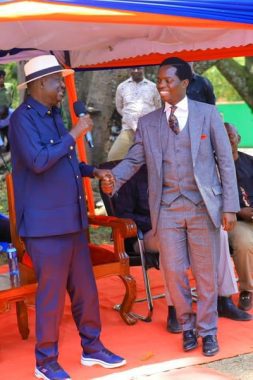Youth leader Kasmuel McOure has penned an explosive and emotional open letter to President William Ruto, calling for justice for slain youth protesters and an end to state-sponsored violence.
His words come just days after the BBC released its chilling documentary ‘Blood Parliament’, which exposed the brutal crackdown on demonstrators during the 2024 anti-Finance Bill protests.
In the letter shared on his social media pages on Tuesday, April 30, 2025, McOure expressed his pain, fear, and frustration with the government’s response to youth-led protests.
Writing with what he described as a quivering voice, unsteady hands, and a disillusioned mind, the ODM Youth League member said he spoke on behalf of a generation that feels betrayed and abandoned.
“I write this because I am still alive. And I am alive either because I am a coward or because I have been spared by chance. I believe it is both, but mostly the former,” he expressed.
“I write with a quivering voice, unsteady hands, and a disillusioned mind. Social media may not be the most dignified forum for addressing a Head of State. But it is where you first heard my name. I will not seek a meeting.”

The open letter painted a vivid picture of the aftermath of the protests, where young Kenyans who called for justice, economic relief, and government accountability were instead met with violence. Many lost their lives; others disappeared or were maimed.
Drawing from Ruto’s humble beginnings, McOure urged him to remember what it means to be poor and disempowered.
The letter also referred to June 26, 2024, a historic day when President Ruto declined to sign the controversial Finance Bill following massive public pressure and unprecedented youth mobilisation. That moment, McOure said, was not just a political victory but a reflection of a generation that found its voice.
“Your peers accuse us of entitlement. Laziness. Fragility. Perhaps. But if we are weak in patience, we are strong in conviction. If we lack decorum, we compensate with moral clarity. When Parliament sought to impose a Finance Bill that would render our lives even more unbearable, we took to the streets-not for clout, but for survival. For bread. For bus fare. For menstrual pads for our lovers, and diapers for our children,” Kasmuel noted.
Adding;
“We asked for accountability. For an end to the theft that masquerades as public service. For a debt audit, because our futures are auctioned off every fiscal year. For an end to police brutality. These are not radical demands. They are the bare minimum conditions of a functioning society. But under your administration, they remain mirages.”
In his message, he invoked Newton’s laws of motion to symbolise the youth movement’s unstoppable force and warned of equal and opposite consequences if justice continues to be denied.
“Shake my hand, Mr. President. I need it now, for my generation. We are nearing a year since the blood of our comrades soaked this soil-and not one of their killers has been brought to justice. Today, you extended clemency to offenders. I ask for a double portion on the other side of the scale. As the custodian of this republic. I ask for the heads of those who murdered my generation. This is both a request and a prophecy,” he stated.

Blood Parliament
The BBC documentary, which has stirred national and international debate, captured the horror of those days: images of young bodies riddled with bullets, crying parents, and bloodstained streets.
The documentary, released on YouTube on Monday, April 30, 2025, meticulously pieced together the events of that day using 3D modelling, forensic video analysis, and eyewitness testimony.
It captured chilling footage of security forces opening fire on civilians as they breached Parliament grounds in protest against the controversial Finance Bill 2024.
On June 25, 2024, tens of thousands of mainly Gen Z protesters flooded Nairobi’s streets to oppose the bill, which proposed sweeping new taxes. Despite fierce public opposition, Parliament passed the bill by a vote of 195 to 106. Minutes after the vote, violence erupted outside the National Assembly.
According to the documentary, the first fatalities occurred on Parliament Road, where David Chege, a 39-year-old software engineer and Sunday school teacher, and Ericsson Mutisya, a 25-year-old butcher, were shot dead.
BBC’s 3D reconstruction showed a police officer kneeling and opening fire directly at protesters, killing Chege and Mutisya and injuring at least five others.
As tensions escalated, protesters stormed the Parliament complex, the first time this had happened in Kenya’s post-independence history.
In the chaos that followed, another life was lost. Eric Shieni, a 27-year-old finance student at the University of Nairobi, was shot in the head while trying to escape through a broken section of Parliament’s perimeter fence. He collapsed on the rubble and died instantly.
The BBC documentary went a step further by identifying Shieni’s shooter. Through careful forensic analysis of video footage and photographs, investigators determined that the assailant, dressed in a matte green helmet, tan boots, and a white shoulder patch and carrying a solid stock rifle, was a soldier from the Kenya Defence Forces (KDF).